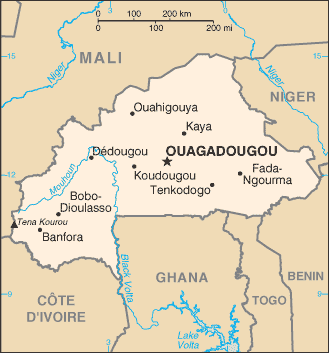Welcome to the Virtual Education Wiki ~ Open Education Wiki
Burkina Faso: Difference between revisions
| Line 38: | Line 38: | ||
'''Pre-primary''' Pre-primary education is open to children aged three to six, and is generally limited to the major towns. | '''Pre-primary''' Pre-primary education is open to children aged three to six, and is generally limited to the major towns. | ||
'''Primary level''' Children enter primary education age six to seven which lasts for six years, which are subdivided into three cycles of two years each. This culminates in an exam for the primary school leaving certificate (CEP) which must be passed in order to progress to secondary education. | |||
'''Secondary level''' | '''Secondary level''' | ||
Revision as of 14:49, 20 April 2011
author byline
Experts situated in Burkina Faso
Burkina Faso in a nutshell

Burkina Faso, also known by its short-form name Burkina, is a landlocked nation in West Africa. It is surrounded by six countries: Mali to the north, Niger to the east, Benin to the south east, Togo and Ghana to the south, and Côte d'Ivoire to the south west.
Its size is 274,000 km² with a population of more than 16.7 million (CIA July 2011 est.).
Formerly called the Republic of Upper Volta, it was renamed in 1984 to mean "the land of upright people" in Moré and Dioula, the major native languages of the country.
Burkina Faso's capital is Ouagadougou.
The country occupies the seventh to last place on the Human Development Index.
Education in Burkina Faso
Education is administrated by three ministries:
- The Ministry of Social Affairs, in charge of pre-primary education;
- The Ministry of Basic Education and Literacy, in charge of primary education, literacy
and non-formal education;
- The Ministry of Secondary, Higher Education and Scientific Research, in charge of
secondary education, higher education and scientific research.
The structure of the Burkinabè formal educational system was inherited from France.
Education has been compulsory from ages 6 to 16 since 1996. [1]
School-level education
Pre-primary Pre-primary education is open to children aged three to six, and is generally limited to the major towns.
Primary level Children enter primary education age six to seven which lasts for six years, which are subdivided into three cycles of two years each. This culminates in an exam for the primary school leaving certificate (CEP) which must be passed in order to progress to secondary education.
Secondary level
Further and Higher education
Universities in Burkina Faso
Université Libre du Burkina University of Ouagadougou University of Koudougou Université Politechnique de Bobo-Dioulasso